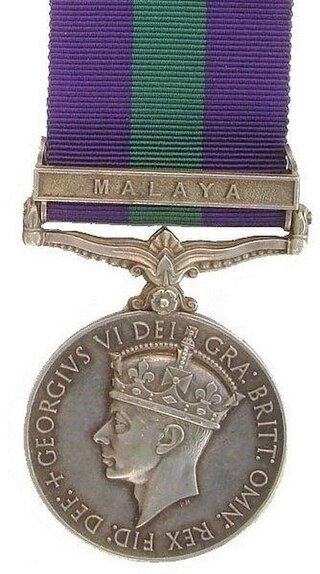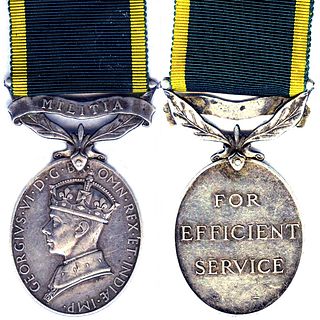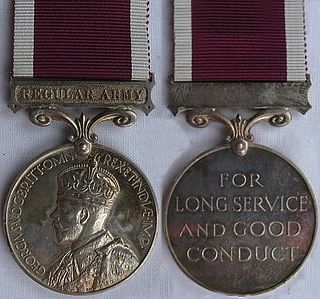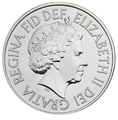
The Distinguished Service Medal (DSM) was a military decoration awarded until 1993 to personnel of the Royal Navy and members of the other services, and formerly to personnel of other Commonwealth countries, up to and including the rank of Chief Petty Officer, for bravery and resourcefulness on active service at sea.

The King's Police Medal (KPM) is awarded to police in the United Kingdom for gallantry or distinguished service. It was also formerly awarded within the wider British Empire, including Commonwealth countries, most of which now have their own honours systems. The medal was established on 7 July 1909, initially inspired by the need to recognise the gallantry of the police officers involved in the Tottenham Outrage. Renamed the King's Police and Fire Services Medal (KPFSM) in 1940, it was replaced on 19 May 1954 by the Queen's Police Medal (QPM), when a separate Queen's Fire Service Medal was also instituted. The current award was renamed the King's Police Medal following the death of Queen Elizabeth II in 2022 and the accession of King Charles III to the throne of the United Kingdom.

The General Service Medal was instituted to recognise service in minor Army and Royal Air Force operations for which no separate medal was intended. Local forces, including police, qualified for many of the clasps, as could units of the Indian Army prior to 1947.

The Naval General Service Medal was instituted in 1915 to recognise service by the Royal Navy and Royal Marines in minor campaigns that would not otherwise earn a specific campaign medal. The Army/Air Force equivalent was the General Service Medal (1918). Both these medals were replaced by the General Service Medal in 1962.

The Australia Service Medal 1939–1945 recognises service in Australia's armed forces, Mercantile Marine and Volunteer Defence Corps during World War II.

The Efficiency Medal was instituted in 1930 for award to part-time warrant officers, non-commissioned officers and men after twelve years of efficient service on the active list of the Militia or the Territorial Army of the United Kingdom, or of the other Auxiliary Military Forces throughout the British Empire. At the same time a clasp was instituted for award to holders of the medal upon completion of further periods of six years of efficient service.

The Meritorious Service Medal (MSM) is a British medal awarded to Senior Non Commissioned Officers and Warrant Officers of the British armed forces for long and meritorious service. From 1916 to 1928, eligibility was extended to cover both valuable services by selected other ranks irrespective of length of service, and for gallantry not in the face of the enemy.

The Medal for Long Service and Good Conduct (Military) is a medal awarded to regular members of the armed forces. It was instituted by King George V in 1930 and replaced the Army Long Service and Good Conduct Medal as well as the Permanent Forces of the Empire Beyond the Seas Medal. The medal was originally awarded to Regular Army warrant officers, non-commissioned officers and men of the UK Armed Forces. It also had a number of territorial versions for the Permanent Forces of the British Dominions. The eligibility criteria were relaxed in 1947 to also allow the award of the medal to officers who had served a minimum period in the ranks before being commissioned. Since 2016, the eligibility was widened to include officers who had never served in the ranks, and so the medal can now be awarded to all regular members of the British Armed Forces who meet the required length of service.
The Overseas Territories Police Medal (OTPM), known as the Colonial Police Medal (CPM) until April 2012, is a medal awarded for gallantry or distinguished service to all ranks of police forces and organised fire brigades in British Overseas Territories, and formerly in Crown Colonies and British Dependent Territories. Police officers in these areas can also be awarded the higher ranking King's Police Medal. The CPM was first awarded in 1938.

The Efficiency Medal (South Africa) was instituted in 1930 for award to part-time warrant officers, non-commissioned officers and men after twelve years of efficient service on the active list of the Citizen Force of the Union of South Africa. At the same time, a clasp was instituted for award to holders of the medal upon completion of further periods of six years of efficient service. The medal superseded the Colonial Auxiliary Forces Long Service Medal.

The Police Long Service and Good Conduct Medal is a decoration for police officers of the United Kingdom. First instituted in 1951, the medal is presented for twenty aggregate years of service in the police services of the United Kingdom.

The Burma Gallantry Medal (BGM) was a military decoration awarded for acts of gallantry, in both war and peace, by Governor's commissioned officers, non-commissioned Officers and other ranks of the British Burmese military. These included its Army, Frontier Force, Military Police, Royal Naval Volunteer Reserve and Auxiliary Air Force. Clasps, attached to the ribbon, could be awarded to mark further awards of the medal.
The Hong Kong Disciplined Services Medal was a long service medal awarded to members of the Hong Kong Disciplined Services in British Hong Kong. Established by Royal Warrant 8 July 1986, the award of the medal was intended to replace the awarding of the Imperial Service Medal. This medal was replaced by both the Hong Kong Customs & Excise Long Service Medal and the Hong Kong Immigration Service Long Service Medal, for long service to members of the respective disciplined services, upon the transfer of sovereignty in 1997, however the same ribbon continues to be used for the Hong Kong Immigration Service Long Service Medal.

The Colonial Prison Service Medal was established on 28 October 1955 as a long service medal of the United Kingdom and the Commonwealth. On 10 April 2012 the medal became known as the Overseas Territories Prison Service Medal, and underwent a minor change in design. This reflected the change in the way Britain's remaining colonies were described, they having been classed as 'Overseas Territories' from 2002.

The Colonial Fire Brigades Long Service Medal, now known as the Overseas Territories Fire Brigades Long Service Medal, was established in 1934 to recognise long service in the fire services of the colonies and overseas territories of the United Kingdom.

The Colonial Special Constabulary Medal was established on 1 April 1957 as a volunteer and part-time long service medal of the United Kingdom and the Commonwealth. On 10 April 2012 the medal became known as the Overseas Territories Special Constabulary Medal, and underwent a minor change in design. This reflected the change in the way Britain's remaining colonies were described, they being classed as 'Overseas Territories' from 2002.

A number of new Sierra Leonean medals were instituted in the decade from 1961, when the country gained independence, until 1971, when Sierra Leone was declared a republic.

The Mauritius Police Long Service and Good Conduct Medal was awarded by the Dominion of Mauritius between 1968 and 1992 to members of the Mauritius Police who completed eighteen years service.

The Mauritius Fire Services Long Service and Good Conduct Medal was awarded between 1968 and 1992 by the Dominion of Mauritius to members of local fire services.

The Mauritius Prisons Service Long Service and Good Conduct Medal was awarded by the Dominion of Mauritius between 1968 and 1992 to staff of the Mauritius Prisons Service who completed eighteen years service.





















